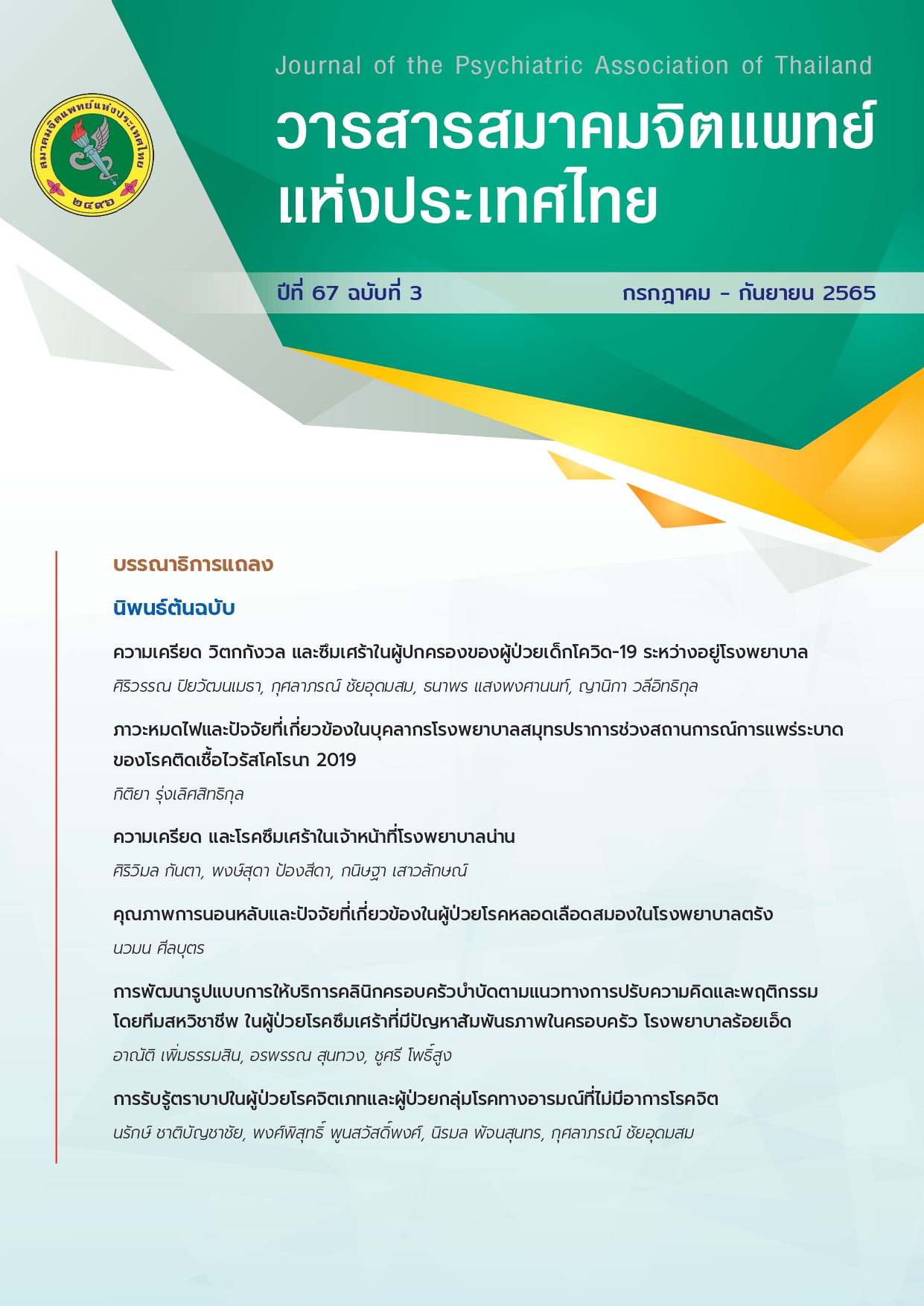Sleep quality and associated factors of patients with cerebrovascular disease in Trang hospital
Main Article Content
Abstract
Abstract
Objective: 1) To study sleep quality among patients with cerebrovascular disease at Trang Hospital. 2) To study factors associated with sleep quality of the patients in 1)
Methods: This research uses a cross-sectional survey method to study patients with cerebrovascular disease
at Trang Hospital. The subjects are 129 outpatients of 18 and older at Trang hospital between December 2021 and February 2022. Research instruments are six documents consisting of personal information questionnaire, medical record, Insomnia Severity Index (Thai version), Epworth Sleepiness scale (Thai version), Pittsburgh Sleep Quality Index (Thai version) and Restless Leg Syndrome questionnaire. All data collected are statistically assessed by using a chi-squared test and Spearman’s correlation matrix.
Results: 53.5 percent of the test patients with cerebrovascular disease are poor sleep quality, about 31.8
percent has clinical insomnia, 7.8 percent suffers from mild excessive daytime sleepiness, and 7.8 percent are affected by restless leg syndrome. The three factors implicitly leading to poor sleep quality in the patients are socio-economic problem (P<.001), family history of psychiatric disease (P=.011) and history of psychiatric medication (P=.002). For excessive daytime sleepiness, it is mostly found in the patients with diabetes mellitus (P=.000) and dyslipidemia (P=.012). The Spearman’s correlation matrix indicates that recurrence of cerebrovascular disease is associated with sleep quality.
Conclusion: Socio-economic problem, family history of psychiatric disease or history of psychiatric medication
may cause poor sleep quality in patients with cerebrovascular disease. Furthermore, cerebrovascular disease patients with diabetes mellitus and dyslipidemia are prone to excessive daytime sleepiness. In reverse, poor
sleep quality may result in recurrence of cerebrovascular disease. Knowing the aforementioned factors relevant
to sleep quality is useful for monitoring in-patients with cerebrovascular disease. For those with recurrence of
the disease, their sleep quality should be seriously investigated so as to detect their sleep problems more
quickly.
Keywords: sleep quality, insomnia, excessive daytime sleepiness, restless leg syndrome, cerebrovascular disease
Article Details

This work is licensed under a Creative Commons Attribution-NonCommercial-NoDerivatives 4.0 International License.
Articles submitted for consideration must not have been previously published or accepted for publication in any other journal, and must not be under review by any other journal.
References
Feigin VL, Forouzanfar MH, Krishnamurthi R, Mensah GA, Connor M, Bennett DA, et al. Global Burden of Diseases, Injuries, and risk factors study 2010 (GBD 2010) and the GBD stroke experts group. Global and regional burden of stroke during 1990-2010: findings from the Global Burden of Disease Study 2010. Lancet 2014; 383:245-54.
Division of Non- Communicable Disease [Internet]. 2019 [Cited 2022 Jan 20]. Available from: https://pr.moph.go.th/?url=pr/detail/2/02/133619.
Baylan S, Griffiths S, Grant N, Broomfield NB, Evans JJ, Gardani M. Incidence and prevalence of post-stroke insomnia: a systematic review and meta-analysis. Sleep Med Rev 2020;49:101222.
Suh M, Choi-Kwon S, Kim JS. Sleep disturbances at 3 months after cerebral infarction. Eur Neurol 2016;75(1-2):75-81.
Leppavuori A, Pohjasvaara T, Vataja R, Kaste M, Erkinjuntti T. Insomnia in ischemic stroke patients. Cerebrovasc Dis 2002;14(2):90-7.
Perez-Carbonell L, Bahie S. Narrative review of sleep and stroke. J Thoracic Dis 2020; 12(Suppl 2): S176-190.
Sadock BJ, Sadock VA. Kaplan and Sadock’s synopsis of psychiatry: Behavioral sciences/clinical psychiatry Eleventh edition: Lippincott Williams & Wilkins; 2015.
Assantachai P, Aekplakorn W, Pattara-Archachai J, Porapakkham Y. Factors associated with insomnia in older people with a mild to moderate degree of poor cognitive ability in Thailand. Geriatr Gerontol Int 2011; 11: 16-23.
Gao B, Cam E, Jaeger H, Zunzunegui C, Sarnthein J, Bassetti CL, Sleep disruption aggravates focal cerebral ischemia in the rat. Sleep 2010; 33: 879-87.
e. Li L-J, Yang Y, Guan BY, Chen Q, Wang A-Z, Wang Y-J, at al. Insomnia is associated with increased mortality in patients with first-ever stroke: a 6-year follow-up in a Chinese cohort study. Stroke Vasc Neurol 2018; 3: 197-202.
Kaewpang P. Relationships between selected factors and insomnia in adult cancer patients. [thesis]. Bangkok: Chulalongkorn University, 2004.
Banhiran W, Assanasen P, Nopmaneejumruslers C, Metheetrairut C. Epworth sleepiness scale in obstructive sleep disordered breathing: the reliability and validity of the Thai version. Sleep and Breathing 2011; 15: 571-7.
Jirapramukpitak T, Tanchaiswad W. Sleep disturbances among nurses of Songklanagarind Hospital. J Psychiatr Assoc Thailand, 1997; 42: 123-32.
Richard PA, Daniel P, Wayne AH, Claudia T, Arthur SW, Jacques M. Restless legs syndrome: diagnostic criteria, special considerations, and epidemiology. Sleep Medicine 2003; 4: 101-119.
Hall M, Buysse DJ, Nofzinger EA, Retnolds CF, Thomson W, Mazumda S, et al. Financial strain is a significant correlate of sleep continuity disturbances in late-life. Biol Pychol 2008; 77: 217-22.
Talala KM, Martelin TP, Haukkala AH, Härkänen TT, Prättälä RS. Socio-economic differences in self-reported insomnia and stress in Finland from 1979 to 2002: a population-based repeated cross-sectional survey. BMC Public Health 2012; 12: 650.
Beaulieu-Bonneau S, LeBlanc M, Mérette C, Dauvilliers Y, Morin CM. The family history of insomnia in a population-based sample,
Sleep 2007; 30: 1739-45.
Siarnik P, Klobucnikova K, Surda P, Putala M, Sutovsky S, Kollar B, et al. Excessive daytime sleepiness in acute ischemic stroke: association with restless legs syndrome, diabetes mellitus, obesity, and sleep-disordered breathing. J Clin Sleep Med 2018; 14: 95-100.
Badescu SV, Tataru C, Kobylinska L, Georgescu EL, Zagrean AM, Zagrean L. The association between diabetes mellitus and depression. J Med Life 2016; 9: 120-5.
Medeiros C, Bruin V, Ferrer B, Paiva T, Montenegro RJ, Forti A, et al. Excessive daytime sleepiness in type 2 diabetes. Arq Bras Endrocrinol Metab 2013; 57: 425-30.
Al-Goblan S, Al-Alfi MA, Khan MZ. Mechanism linking diabetes mellitus and obesity. Diabetes Metab Dyndr Obes 2014; 7: 587-91.
Resta O, Foscino BM, Bonfitto P, Giliberti T, Depalo A, Pannacciulli N, et al. Low sleep quality and daytime sleepiness in obese patients without obstructive sleep apnoea syndrome. J Intern Med 2003; 253: 536-43.
Berger K, Luedemann J, Trenkwalder C, John U, Kessl C. Sex and the risk of restless legs syndrome in the general population. Arch Intern Med 2004; 164: 196-202.


